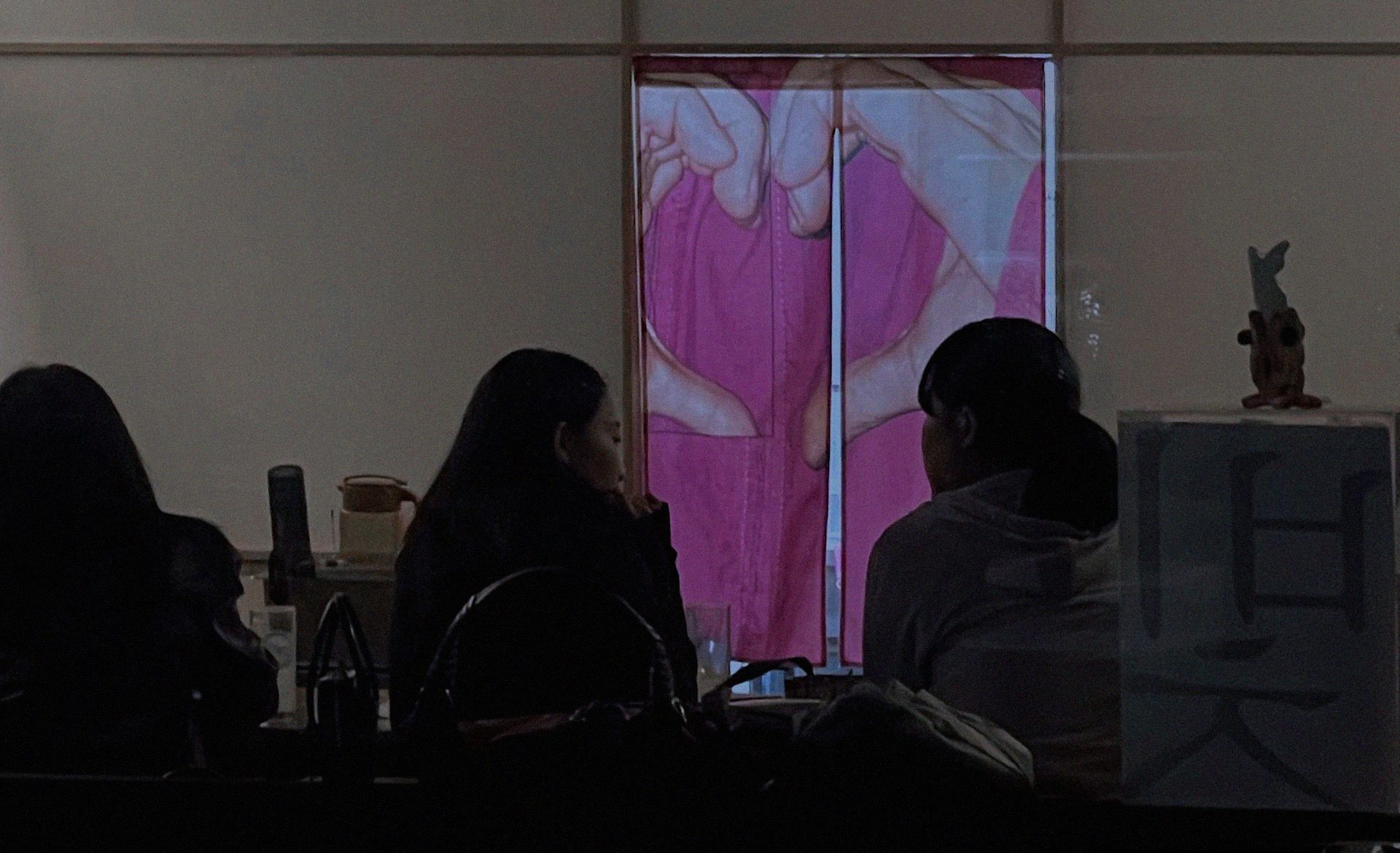Seojin,
it’s morning and I should feel restored from the eight hours of sleep but the residues of my dreams cling to my skin like plastic wrap. I am on my way to work and trying to decide which messages I should answer first. Since I moved to Seoul, it feels like my life has been projected onto the slippery screen of my phone. As I attempt to capture my experience of a new life in short messages or voice memos – the tangible connection through voice took on a deeper significance as I grappled with the sense of physical dislocation –, I‘m wondering if it is true what I write. Instead of answering the messages, I start to write this text in my notes app, not knowing where to organise my thoughts from the last 4 months after relocating from Zürich, the town I grew up in, to Seoul. ‚It‘s all the new impulses you have to process which makes you so tired‘, a friend writes in a lengthy email. She‘s the only one who writes emails instead of calling or texting. I prefer emails and audio messages these days. It doesn’t feel like I have to submit to the short messages format of iMessage or IG, none of which seem to be really designed to share your fragmented thoughts.
From the first time I stepped into my new workplace and met you, I felt a sense of connection. I could feel a special sensibility and care that the people exuded. It’s Nunchi, my coworkers explained.
Nunchi (Kor.: Eye-measurement): „Nunchi is the art of sensing what people are thinking and feeling, and responding appropriately. It’s speed-reading a room with the emphasis on the collective, not on specific individuals. It might be the most important word I ever learned.“ writes Euny Hong in the NY Times.
My coworkers try to teach me many words that I believe hold specific meaning for them: Nunchi, Joeng, Han. Many of them relating to a specific emotional state. Unfortunately Nunchi also enforces social hierarchies and gender roles as it is often equated with professionalism to provide care. Feeling this sensibility made me wonder, what it actually means to feel connected–at least for me?
Yesterday, I met a group of Dokads, an acronym for Descendants of Korean Adoptees. When I first heard about the group, I felt hesitant to see it as a defining factor. Isn’t it my mother’s experience not mine? Still, I can’t deny that coming to South Korea wasn’t driven by a romanticized notion of a past that isn’t directly rooted in my lived experience, but one that I feel has been passed down to me by my mother. A thought that my mother is very scared about. The idea that her story, her trauma, lives on through me. Growing up, not fitting in visually, I always felt a sense of displacement. This sensation* (not in a physical but in an affective sense of my home as my body or the skin as Sarah Ahmed writes), I can’t quite place, accompanied me my whole life.
* Since you asked me how I visualise and store thoughts and emotions in my head, that I haven’t quite grasped yet and you described these repositories as marbles – due to a lack of a better word you said – it stuck too me. I like the word and how we have been sharing thoughts on this feeling we can’t place. Trying to find answers in theories on transnationalism and nomadic subjects, while not being fully content with either.
I thought that meeting people who knew this feeling, would create a sense of belonging. As I listened to their stories, I could hear echoes of my own experience in their words. But the more I focused on our similarities, the more I became aware of our differences. When I saw an open call for a tofu research club hosted by an art space in Seoul, I felt so compelled to have found similarities in, or despite, the differences. The specificity of it felt liberated from the confines of an essentialist notion—where you either possess some traits or you don’t. I was so happy to join a group based on a shared interest I chose for myself rather than something I was categorised as by others.
In 2017, I interned at the Swiss Institute for Art History, which houses an extensive collection of letters by Swiss artists. I remember reading a letter of one artist talking in length about his melancholia. What would have been seen as less intellectual, and lacking in ‘rationality’—if written by a female* artist— added to his modernist image of a male genius. With a recent attention on auto-theoretical texts such as Borderlands/La Frontera: The New Mestiza by Gloria Anzaldú and Maggie Nelsons Argonauts, a personal mode of writing gained momentum, that sees of one self’s position and lived experience as an integral part of theorizing. I was intrigued by this idea to not presume to be above or outside the theoretical discourse but instead emphasise my position within.
Having worked in the art world in different positions but always ones that required a high level of organisational skills, overview and responsibility with low visbility and appreciation, I have wondered more than once why I do the job I do. I have met so many thoughtful, interesting people who have considered leaving the art world for good because they feel exhausted to perform, exhausted from trying to care for the artists, the collaborators or their team but rarely being cared for. It is the people with whom I had the most meaningful discussions with. This letter is both the result and the subject of such insightful conversations in and around art. I am aware that texts, such as these, act as cultural capital in my career but I‘m tired of performing taste and/or position and demonstrating a particular vocabulary to signal political inclusivity, all the while perpetuating exclusion. I don’t refuse, however, that a highly specialised discourse (like any other) will have its own reference systems and terms, but I want to use it here to acknowledge the thoughts of others, not to polish my CV. A sentiment shared by Tula and Irini (the founders of Daily Lazy), which is why they were so generous in offering their platform for this kind of experiment.
Recently I have been thinking about love letters a lot: From Roland Barthes ‚A Lovers Discourse‘ to my own pen pals (Brieffreundschaften) which was a popular format in my childhood. I like how sharing thoughts still in the process of becoming holds its own value. With this format, I want to call Love Letters, I would like to test an alternative to the self-serving text, the performative self-mystification and the paranoid reading.
‘Isn’t it fascinating how the paranoid subject deconstructs everything while simultaneously producing itself?’ a friend reflects in their audio message, which I listen to during my subway commute, being surrounded by strangers but – in this moment – feeling closest to my friend.’
I want to draw on the intimacy of letters as a way of writing that is both generative and reparative. Love Letters should offer a space where one can write to someone they admire, or reflect on a past conversation, a recently witnessed show (be it a TV show or art exhibition). It’s an attempt to capture a stream of consciousness, offering not a comprehensive account but a fleeting trace of thoughts and exchanges —ones that might be revisited, revised, and undoubtedly expanded over time. Art, in the broadest sense of any aesthetic inquiry, serves here as the shared interest that compels us to think within and through it.
The idea for this format first formed in my head in 2024 because I was invited by Antonia and Julia to contribute to their final show of their art space Hamlet. Their intimate exhibition texts inspired me to write an intimate letter in return. The idea of the letter resurfaced as I reflected on the newfound physical distance between my friends and me, having to relay more heavily on digital technologies to stay connected and took form after multiple exchanges with you resulting in this letter.
I’m trying to resist the need to give it a more defined shape, as it will slowly take form through continued exploration and repetition.
Love,
Céline
Hu Xianqian, Trend Blindy, 2005, videostill.
Reading List
Sarah Amed, „Home and away: Narratives of migration and estrangement“, in: International Journal of Cultural Studies, 1999.
Lauren Fournier, Autotheory as Feminist Practice in Art, Writing, and Criticism, 2021.
Karen Barad, On Touching – The Inhuman That Therefore I Am, 2012.
Song List
Tuesday Beach Club, Endless Shine, 2022.
Shin Hae Gyeong, Piscis, 2024.
모자이크, Your Way of Thinking, 1993.
Air, Ce-matin-là, Demo 2, 1998.


